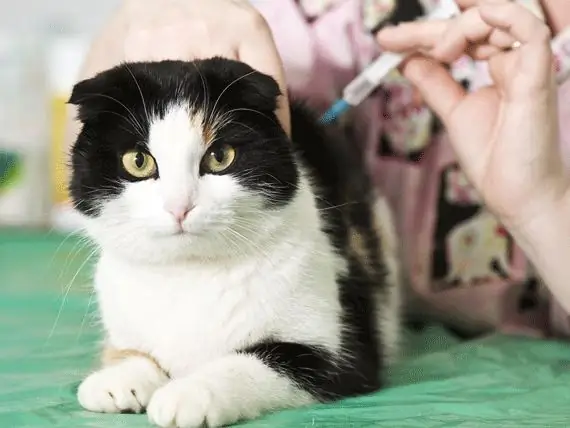
- Autor Daisy Haig haig@petsoundness.com.
- Public 2023-12-17 03:13.
- Modificat ultima dată 2025-06-01 06:48.
Deci, pentru ce este acel test jenant de caca, oricum?
Este suficient de stresant ca spatele animalului dvs. să fie încălcat de o tijă de plastic, nu? Ce rost are deci?
Spui: Dacă scopul este să-mi fac animalul de companie mai sănătos și fără paraziți, atunci voi avea încredere în judecata ta, dar trebuie să spun că verificările scaunelor sunt un fel de pedeapsă crudă și neobișnuită. Nu primesc acest tip de umilință până nu sunt bărbat și patruzeci de ani, nu? Și fecalele nu sunt atât de utile, nu?
Spun: Pentru început, nu este necesar ca animalul tău să cedeze cu lanseta dastardly. Un eșantion proaspăt este obținut cu ușurință dimineața (sau după-amiaza) înainte de vizita dvs. anuală sau oricând animalul dumneavoastră suferă simptome gastro-intestinale. Nu este atât de dur, într-adevăr. Și dacă momentul nu este tocmai potrivit (scaunul nu ar trebui să fie mai vechi de o oră pentru cele mai bune rezultate), spitalul veterinar nu vă va refuza dreptul de a aduce un eșantion foarte proaspăt, după cum vă convine. Promisiune.
Și da, examinările fecale, deși relativ ieftine și de rutină, sunt indispensabile. Dar, după cum va demonstra acest post, este adevărat că nu toate testele fecale vor detecta o infecție cu paraziți la animalele de companie. De aceea pot fi necesare examinări fecale anuale și / sau seriale.
Acum, pentru obiectivul principal al testului:
Veterinarii sunt mereu în căutarea unor paraziți care ar putea intra în tractul gastro-intestinal al animalelor de companie. Sigur, și noi, oamenii, putem obține paraziți, dar stilurile noastre de viață moderne tind să fie mai puțin favorabile infecției cu paraziți. (Când ați fost ultima dată când ați mers snuffing în curte, cu buzele la pământ, doar pentru a putea inhala un turd felin sau două?)
Da, animalele de companie primesc o mulțime de paraziți. Iată o eșantionare a celor mai comuni paraziți gastro-intestinali pe care îi văd aici [în raiul parazitului care este semi-tropical în Florida de Sud]:
Viermi rotunzi la câini și pisici.
Hookworms la animale de companie
Viermi la animalele de companie
Giardia la animale de companie

Afecțiuni hepatice la animale de companie
Afecțiuni hepatice la animale de companie
coccidia in pets
i’ll not go into the gory details on each but you can click on the links and check out the info for a better understanding of how these parasites can potentially affect your pets and even your human family.
sure, pet-popular parasites don’t often infect humans in the so-called, “developed” nations all of you reading this likely live in, but that doesn’t mean it doesn’t happen. roundworms and hookworms are still a factor in humans in the us, as is giardia, which will give you the nastiest case of diarrhea you can imagine short of amoebic dysentery.
since veterinarians are also on the front lines when it comes to public health, consider that fecal exams are not just necessary for healthy pets, they’re essential for healthy humans, too, more so if your family members are very young children, very old adults or otherwise immunocompromised (transplant patients, hiv-positive humans, chemo recipients, etc.).
how do we identify these critters in the fecal exam?
the short answer: with a microscope.
the long answer: we take a tiny sample of your pet’s stool (very fresh is always best). a few grams is enough (think an eighth of a teaspoon if that’s easier). then we put it through one of three processes.
1. the smear: we take about a half gram of stool and smear it onto a microscope slide to search for parasites (and bacteria) directly. many times we’ll see them swimming about. finding evidence of parasites in a simple smear is often indicative of severe infection.
2. the float: this method relies on mixing the stool with a special solution. it filters out the big pieces of stool in a tube or other cylindrical vessel and allows the eggs and other small critters to float up to the top, buoyed by the solution’s specific gravity. a microscope slide’s cover slip is typically used to recover the floaters. some parasites, however, aren’t amenable to flotation. eggs seem to do best through this method.
3. centrifugation: spinning the heck out of stool in a centrifuge when it’s mixed in a sugar solution picks up about 50% more parasite eggs and oocysts than through flotation. therefore, i like this method best for worm eggs, giardia, and coccidia--though i’d never go without a smear. problem is, most hospitals don’t yet use this method. it’s more expensive than others and research demonstrating it’s much greater efficacy is fairly recent.
so now you know the truth: not all fecal exams are created equal. not only does this test rely on careful selection of materials and methods, it also requires a trained eye. in our practice, for example, one of our techs detects parasites about 50% more often than the veterinarians and other techs/assistants. (that’s why we also do floats so that she can check them all at her convenience when she comes back from her day off.)
it’s also true that even a parasite-infected animal will often not come up positive on a fecal test. human error and equipment choice are factors, but so is the parasite itself. sometimes they do not make themselves known in the stool. worms sometimes aren’t shedding their eggs and subclinical (low-grade or smoldering) infections may not reveal much, either.
again, that’s why it’s important to perform this test as often as is reasonable. for all dogs and cats at least three times during the first few months of life. i want to see at least two negative tests in a row, a month apart, before i’ll feel comfortable that my patient is parasite-free.
for adults, once a year is great--that is, unless they show gastrointestinal illnesses. in this case, serial fecal tests make sense--or at least one every time the symptoms recur until a definitive diagnosis is made (whether it’s parasites or something else).
ultimately, fecal tests are a critical component of our veterinary hat of tricks. doing without may seem like the economically wisest thing in the absence of gastrointestinal symptoms, but consider: parasites can wear pets down in ways you might not expect. and it’s never wrong to be too safe in the presence of diseases that may also affect your family. ‘nuff said.
Recomandat:
În Culise: Cum Este Vizita Veterinară Peste Noapte A Animalului Tău De Companie

Când animalul dvs. de companie trebuie să petreacă noaptea la spitalul pentru animale, poate fi greu atât pentru dvs., cât și pentru animal. Iată ce se pot aștepta proprietarii de la vizita veterinară peste noapte a animalului lor de companie
Cât De Sigure Sunt Produsele Chimice Pentru Gazon Pentru Animale De Companie? - Gazonul Tău Perfect Omoară Animalul Tău De Companie?

În timp ce americanii se străduiesc să obțină peluza verde perfectă, ei folosesc o gamă largă de substanțe chimice pentru a-și atinge obiectivele. Din păcate, acest lucru are un efect dăunător asupra mediului și animalelor care trăiesc în el. Cum afectează produsele de grădină și grădină animalele noastre de companie? Citeste mai mult
Ai Avea încredere în Sănătatea Animalului Tău De Companie Asistentului Tău Veterinar?

Ai avea încredere în sănătatea animalului tău de companie asistentului veterinar? Adăugarea unui nivel „mediu” de îngrijire veterinară, la fel ca asistentul medicului de medicină umană, poate economisi timp și bani pentru consumatori și poate face îngrijirea veterinară pentru zonele geografice defavorizate. Citeste mai mult
Ce Spune Bloodwork Veterinarul Tău Despre Sănătatea Animalului Tău De Companie

Prelucrarea sângelui este efectuată pentru a ne asigura că suntem la fel de sănătoși pe dinăuntru pe cât aparem în exterior sau pentru a monitoriza afecțiunile medicale diagnosticate anterior. Același lucru este valabil și pentru animalele de companie. Aflați mai multe despre ceea ce vă poate spune medicul veterinar
Este O Adevărată Carne în Mâncarea Animalului Tău De Companie?

Hrana pentru animale de companie nu conține carnea pe care crezi că o are. Nici nu conține cantitatea de carne pe care crezi că o are. Asta deoarece definiția oficială a „cărnii” pentru hrana pentru animale de companie este diferită de percepția dvs. despre „carne”. Citeste mai mult
